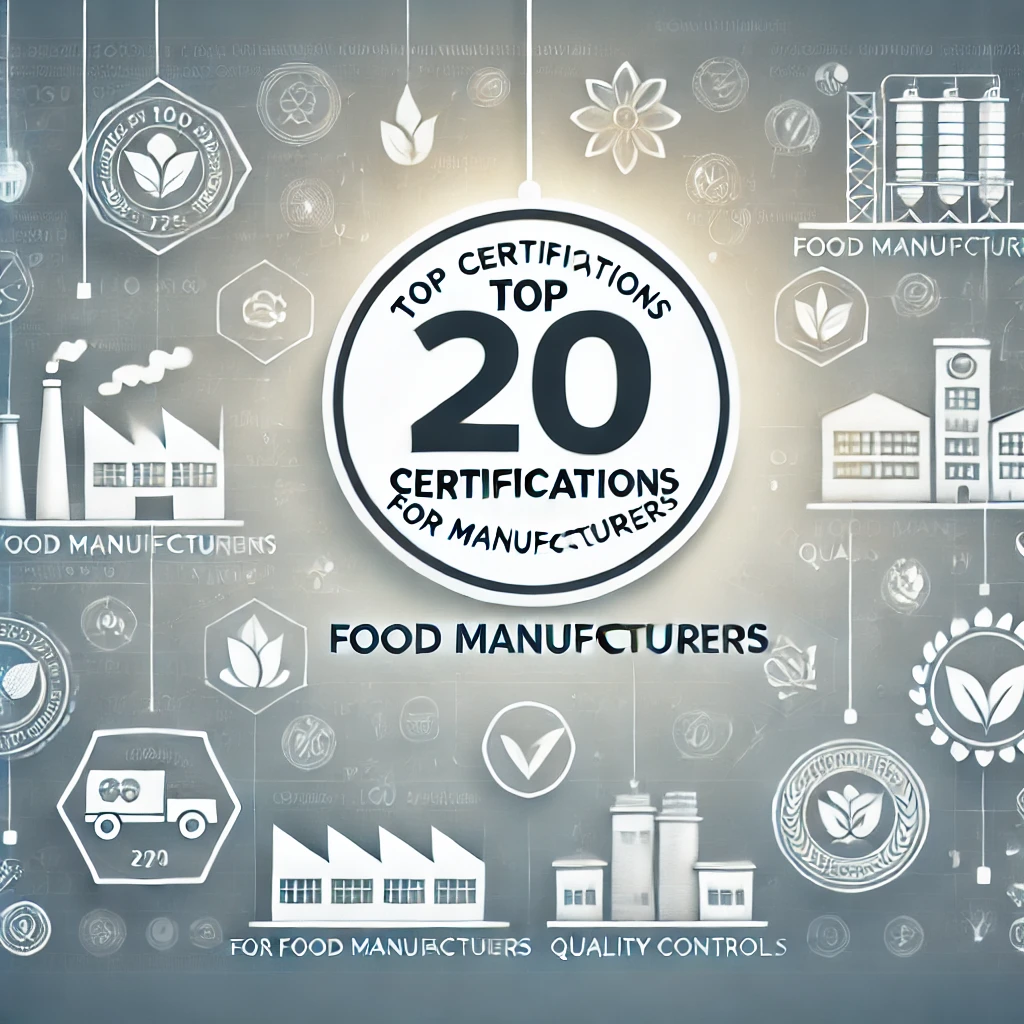For food manufacturers, certifications are essential. They help ensure that food is safe, high-quality, and produced in a way that respects the environment and ethical standards. In this guide, we’ll explore the top 20 certifications for food manufacturers, detailing what they cover and how they benefit both companies and consumers.
1. ISO 22000: Food Safety Management Systems
Purpose: To ensure safe food handling from production to consumption.
Scope: ISO 22000 is an international standard that covers all stages of the food chain, helping organizations identify and control food safety hazards.
2. BRCGS (British Retail Consortium Global Standards)
Purpose: To set quality and safety standards for food production.
Scope: Known worldwide, BRCGS is critical for companies exporting to UK markets. It’s focused on food safety, legality, and quality.
3. SQF (Safe Quality Food)
Purpose: To ensure food safety and quality for global trade.
Scope: SQF is recognized by the Global Food Safety Initiative (GFSI) and helps companies implement rigorous food safety controls.
4. HACCP (Hazard Analysis and Critical Control Points)
Purpose: To systematically prevent food safety issues.
Scope: HACCP identifies and controls potential hazards in food processing and is required for many food businesses globally.
5. FSSC 22000 (Food Safety System Certification)
Purpose: To improve food safety across global supply chains.
Scope: FSSC 22000 builds on ISO 22000 with additional requirements, making it highly respected and globally accepted.
6. GMP (Good Manufacturing Practice)
Purpose: To ensure food quality and hygiene in manufacturing.
Scope: GMP focuses on food production processes, ensuring cleanliness, safety, and consistency in the manufacturing environment.
7. USDA Organic
Purpose: To certify food products as organic in the United States.
Scope: USDA Organic certification ensures that foods are produced without synthetic pesticides, fertilizers, or GMOs, supporting natural farming practices.
8. Kosher Certification
Purpose: To verify that food meets Jewish dietary laws.
Scope: Kosher certification is essential for companies targeting Jewish consumers, focusing on ingredients and production processes that meet religious standards.
9. Halal Certification
Purpose: To ensure food is permissible under Islamic law.
Scope: Halal certification is widely recognized in Muslim-majority countries and ensures that food meets specific guidelines from sourcing to processing.
10. Non-GMO Project Verified
Purpose: To guarantee that products contain no genetically modified organisms (GMOs).
Scope: Non-GMO Project Verified certification ensures consumers that food products are free from GMOs, which is important for many health-conscious buyers.
11. Rainforest Alliance Certified
Purpose: To promote environmental responsibility and sustainable farming.
Scope: Rainforest Alliance focuses on sustainable practices, supporting biodiversity, and fair wages for farmers.
12. Fair Trade Certification
Purpose: To ensure fair wages and working conditions for farmers.
Scope: Fair Trade certification helps assure consumers that products are sourced ethically, promoting better living conditions for farmers.
13. Gluten-Free Certification
Purpose: To ensure food safety for those with gluten sensitivities or celiac disease.
Scope: Gluten-Free certification guarantees that products contain no gluten, making them safe for individuals with dietary restrictions.
14. Global GAP (Good Agricultural Practice)
Purpose: To promote safe and sustainable agricultural practices.
Scope: Global GAP is a leading certification for agricultural products, helping farmers improve their practices and meet global food standards.
15. Certified Humane
Purpose: To promote animal welfare in food production.
Scope: Certified Humane certification ensures that animals used in food production are treated ethically, with standards for humane care.
16. MSC (Marine Stewardship Council) Certified
Purpose: To promote sustainable seafood harvesting.
Scope: MSC certification ensures that seafood is sourced responsibly, supporting ocean ecosystems and preventing overfishing.
17. ISO 9001: Quality Management System
Purpose: To maintain high standards in quality management.
Scope: Although not specific to food, ISO 9001 helps food companies ensure consistent quality in their processes.
18. LEED Certification
Purpose: To promote environmentally sustainable building and operations.
Scope: LEED certification is for facilities and promotes energy-efficient, eco-friendly practices in food production spaces.
19. AIB (American Institute of Baking) Certification
Purpose: To ensure quality and safety in food processing.
Scope: AIB certification focuses on food safety inspections, making it essential for bakeries and food production facilities.
20. ISO 14001: Environmental Management System
Purpose: To promote sustainable environmental practices.
Scope: ISO 14001 certification helps food manufacturers minimize their environmental impact, ensuring compliance with eco-friendly practices.
Table: Top 20 Certifications for Food Manufacturers
| Rank | Certification | Purpose | Scope |
|---|---|---|---|
| 1 | ISO 22000 | Food Safety Management | Global food safety standard |
| 2 | BRCGS | Quality and safety in food production | Focused on UK markets |
| 3 | SQF | Safe Quality Food | Global trade |
| 4 | HACCP | Food safety hazard prevention | Required for many food businesses |
| 5 | FSSC 22000 | Food safety across supply chains | Global acceptance |
| 6 | GMP | Quality and hygiene in manufacturing | Consistency in production |
| 7 | USDA Organic | Organic certification in the U.S. | No synthetic pesticides or GMOs |
| 8 | Kosher | Meets Jewish dietary laws | Specific guidelines in production |
| 9 | Halal | Permissible under Islamic law | Sourcing to processing standards |
| 10 | Non-GMO Project Verified | No GMOs in products | Assurance for non-GMO consumers |
| 11 | Rainforest Alliance | Environmental responsibility | Supports biodiversity |
| 12 | Fair Trade | Fair wages and working conditions | Ethically sourced |
| 13 | Gluten-Free | Safe for gluten-sensitive individuals | No gluten in products |
| 14 | Global GAP | Safe and sustainable agriculture | Agricultural products |
| 15 | Certified Humane | Animal welfare in food production | Standards for humane care |
| 16 | MSC | Sustainable seafood | Responsible seafood sourcing |
| 17 | ISO 9001 | Quality management | Consistent production quality |
| 18 | LEED | Environmentally sustainable operations | Energy-efficient facilities |
| 19 | AIB | Quality in food processing | Essential for bakeries |
| 20 | ISO 14001 | Environmental management | Reduces environmental impact |
These certifications ensure that food manufacturers can deliver safe, high-quality, and responsibly sourced products to consumers, fostering trust and supporting sustainable practices in the global food industry. Whether focusing on food safety, quality, or environmental responsibility, each certification brings valuable benefits to both companies and consumers.
Benefits of Food Manufacturing Certifications
Obtaining certifications can be a big commitment, but the benefits for food manufacturers and consumers alike are substantial. Here’s why these certifications matter:
1. Enhanced Consumer Trust
- Certifications signal to consumers that a food product is safe, high-quality, and responsibly made. When shoppers see labels like USDA Organic or Non-GMO Project Verified, they feel reassured about what they’re purchasing.
2. Market Expansion Opportunities
- Many certifications, like BRCGS or SQF, are internationally recognized and often required for exporting to certain countries. Having these certifications can open doors to new markets and improve competitive advantage.
3. Increased Product Quality and Consistency
- Certifications like GMP (Good Manufacturing Practice) and ISO 9001 emphasize quality management systems. This helps ensure that products meet consistent standards, reducing defects and recalls, and increasing customer satisfaction.
4. Reduced Environmental Impact
- Certifications such as LEED and ISO 14001 focus on environmental management. By following these guidelines, manufacturers reduce waste, conserve energy, and contribute positively to the environment.
5. Food Safety Compliance
- Many of these certifications, especially HACCP, FSSC 22000, and SQF, focus on preventing contamination, ensuring hygienic practices, and protecting consumers from foodborne illnesses. This is crucial for maintaining the trust and health of consumers.
Choosing the Right Certification
Not all certifications will be relevant for every food manufacturer. Choosing the right certifications depends on several factors:
- Target Market: For example, a company exporting to the U.S. might prioritize USDA Organic or Gluten-Free Certification, while a company exporting to the Middle East may need Halal Certification.
- Type of Product: Some certifications, like MSC (for seafood) and Certified Humane (for animal welfare), are product-specific. Understanding the product’s niche and consumer expectations helps guide certification choices.
- Company Values and Goals: Certifications that align with a company’s mission can strengthen its brand. For example, a company focused on sustainability might prioritize Rainforest Alliance and LEED certifications.
Conclusion and Summary Table
Achieving and maintaining certifications is a worthwhile investment for food manufacturers. Certifications not only elevate a brand’s credibility but also demonstrate a commitment to quality, safety, and ethical practices.
| Rank | Certification | Purpose | Main Focus |
|---|---|---|---|
| 1 | ISO 22000 | Global food safety standard | Food safety from farm to table |
| 2 | BRCGS | Quality and safety in production | Focused on UK standards |
| 3 | SQF | Safe food production | Essential for global trade |
| 4 | HACCP | Prevents food safety issues | Hazard prevention in food handling |
| 5 | FSSC 22000 | Food safety system certification | Comprehensive food safety |
| 6 | GMP | Manufacturing hygiene and quality | Consistency in food production |
| 7 | USDA Organic | Organic food production | U.S. organic certification |
| 8 | Kosher | Meets Jewish dietary standards | Ingredients and processing compliance |
| 9 | Halal | Permissible under Islamic law | Meets Islamic dietary guidelines |
| 10 | Non-GMO Project Verified | GMO-free assurance | For health-conscious consumers |
| 11 | Rainforest Alliance | Sustainable farming | Environmental and social responsibility |
| 12 | Fair Trade | Supports fair working conditions | Ethical sourcing |
| 13 | Gluten-Free | Safe for gluten-sensitive consumers | Products free from gluten |
| 14 | Global GAP | Sustainable agriculture | Good practices in farming |
| 15 | Certified Humane | Ensures humane animal treatment | Ethical animal care |
| 16 | MSC | Promotes sustainable seafood | Supports marine biodiversity |
| 17 | ISO 9001 | Quality management | Quality assurance in processes |
| 18 | LEED | Sustainable facility certification | Eco-friendly production facilities |
| 19 | AIB | Safety and quality in food processing | Safety inspections |
| 20 | ISO 14001 | Environmental management | Reduces environmental impact |
For food manufacturers, these top certifications pave the way for safer, more reliable, and ethically produced food. By meeting these standards, companies build trust with consumers and strengthen their brand’s reputation on a global scale.

